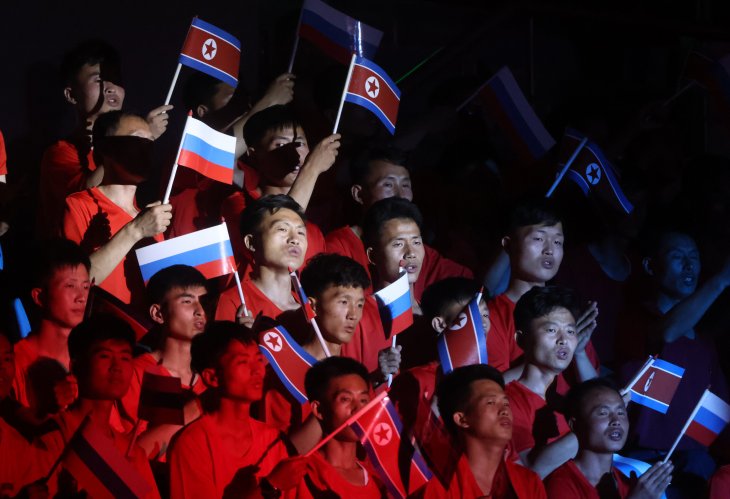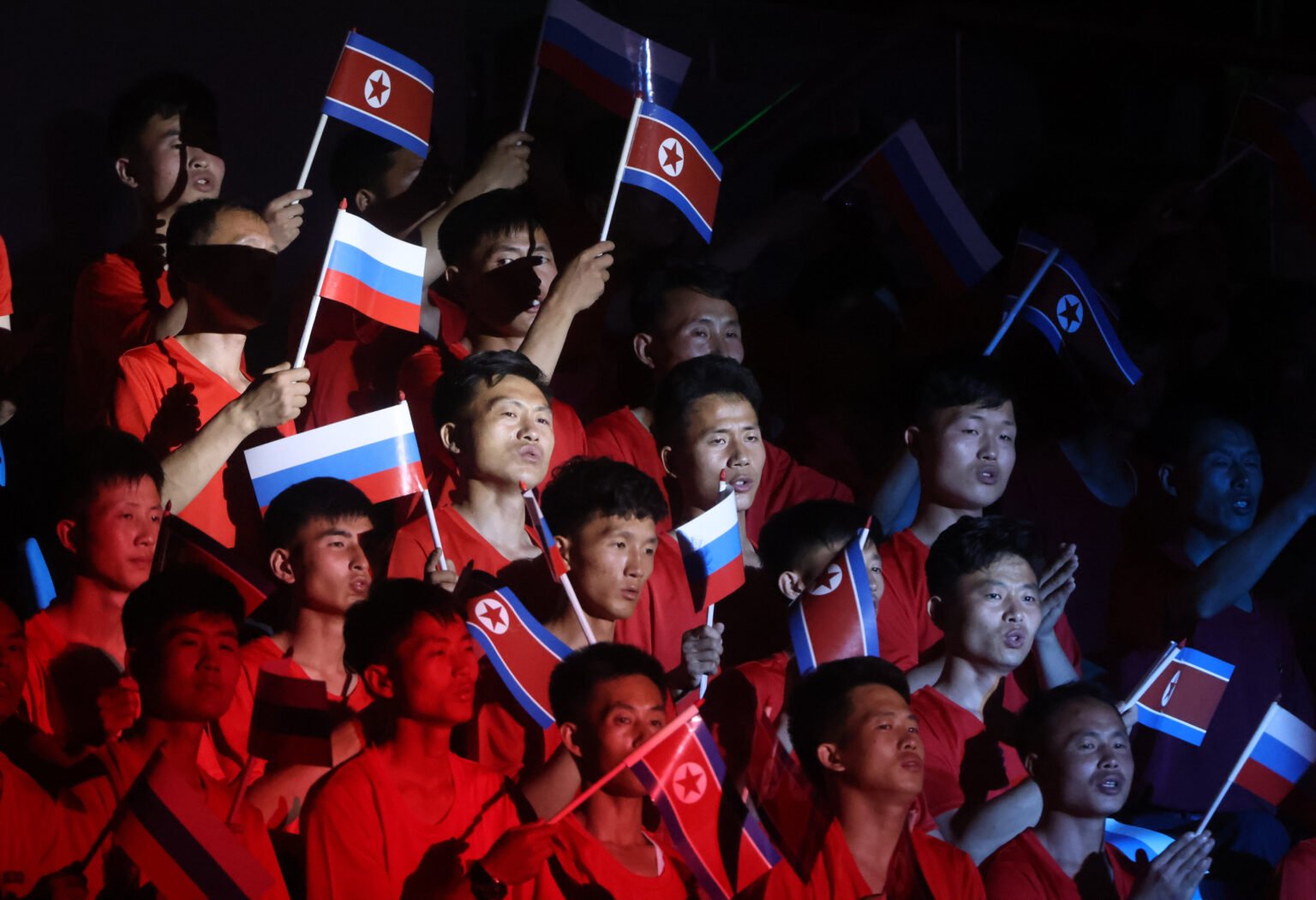The US presidential election, which has captured global news, will reach its natural climax on November 5, even if it remains uncertain for many more days.

Pyongyang, North Korea June 19, 2024. Vladimir Putin is in North Korea for a two-day diplomatic visit. Photo: Contributor/Getty Images
Even in Russia, where war and inflation are major concerns, official sources report that more than 60 percent of adults are following the US election. Independent polls show that only about 19 percent follow closely (TASS31 October).
Trump favors Russia
Although almost half of Russians think the election results are of little importance to their country, those who do care about the result prefer former President Donald Trump (Levada.ru31 October). The Kremlin appears to have the same preference — and reluctance to act on it — all while treating U.S. accusations of Russian meddling as slander (IzvestiaNovember 2).
The main political experts in Moscow prepare competent analyzes of the issues of interest in the US elections, highlight the depth of disagreement between the elite and society, and assess the dynamics of the US’s disengagement from European affairs (“Rossiiskaya Gazeta”October 29). However, Russia’s leadership is less concerned with long-term trends and more focused on grasping the opportunities presented by the Biden administration’s preoccupation with potential war zone votes and avoiding controversial foreign policy actions (Nezavisimaya newspaper31 October).
Partner in North Korea
In this opportunistic maneuver, Russian President Vladimir Putin has a useful partner in North Korean dictator Kim Jong Un, who has abandoned the traditional mantra of Korean reunification and wants to play fast and loose in the space left open by US inattention (RIACSeptember 2).
This maneuver involves the arrival of North Korean troops in Russia (see EDMOctober 30). The plan, apparently agreed upon during Putin’s visit to Pyongyang last June and put into effect in mid-October, initially called for the “export” of 1,500 elite special forces and later 10-15,000 “light infantry” to Russia for rapid training and education. further use in combat operations (see EDMJune 24; Svoboda.orgOctober 21).
In retrospect, this arrangement makes perfect sense. Putin is determined to continue the offensive in the Donbas region, and each tactical advance costs tons of artillery shells and hundreds of lives (Republic.ruOctober 30). Likewise, as munitions are required by trainloads from North Korea to supplement Russia’s domestic production, battalions of submissive soldiers will compensate for declining recruitment, which has already led to acute industrial labor shortages and social discontent (see EDM, August 7, October 10; MedusaOctober 28).
At the current rate of Russian casualties, 10,000 new recruits must be recruited every week. North Korean Foreign Minister Cho Son Hui, who visited Moscow last week, confirmed that Kim had ordered all necessary support for Russia in its “holy war.”RBCNovember 1; NV.uaNovember 2).
Russia will pay compensation to North Korea
The extent of Russia’s demand is relatively clear, but the nature of its supply to North Korea remains unclear. It is highly improbable that the export of oil and wheat, as necessary as these commodities are, will provide sufficient compensation for the use of another nation’s soldiers as cannon fodder (Novaya newspaper EuropeOctober 23).
It may have been a coincidence that North Korea successfully launched the Malligyong-1 reconnaissance satellite in November 2023, two months after the cordial meeting between Putin and Kim at the Vostochny Cosmodrome.InterfaxMay 28). It may be another coincidence that Kim took his daughter to watch the test launch of the Hwasong-19 heavy intercontinental ballistic missile from the Pyongyang region last Thursday when the first North Korean troops arrived in Kursk province.RIA NovostiNovember 1). Coincidences happen, but the rapid progress of North Korea’s missile program is likely due to Russian expertise and technology transfer (RE: RussiaOctober 28).
Avoid escalation
South Korea is the country most concerned about the creation of an axis between Moscow and Pyongyang. Defense Minister Kim Yong-Hyun visited Washington to coordinate the response. Seoul’s reaction was also related to sending a monitoring mission to Kyiv (KnowledgeNovember 1). Japan and the US have moved air assets, including a B-1B strategic bomber, to hold trilateral military exercises with South Korea in a show of unity.
However, it is clear to Moscow that Washington’s main concern right now is to avoid escalation (KommersantNovember 1). Many European politicians share this view, but Ukrainian President Volodymyr Zelensky’s argument that the deployment of North Korean troops is an escalating step that threatens global security is irrefutable (Interfax UkraineNovember 1). All favorable doubts about North Korea’s intervention in Ukraine have now disappeared as North Atlantic Treaty Organization (NATO) Secretary General Mark Rutte has confirmed the arrival of North Korean troops, a clear signal of Putin’s desperation.News.ruOctober 28).
Beijing’s role
Adequate and proportionate responses to this escalation are still being debated, and Washington’s authorization of Kiev to launch long-range missile strikes on Moscow as well as Pyongyang is still pending (The Moscow TimesOctober 28).
Beijing is the only institution that can prevent Putin and Kim from escalating further in the window of opportunity that the US election may present (KommersantNovember 1). China is said to be unhappy with the rapid deployment of North Korean troops to the Ukrainian front, which is contrary to its stated goal of ceasefire talks and eventual settlement of the conflict (KnowledgeNovember 2; NV.uaNovember 3).
Russia maintains that it is innocent of offending its top strategic partner, yet its experts insist that Western attempts to strain Russia-China relations have failed (RIACNovember 1).
Different concerns
Autocratic and rogue regimes of different persuasions have strikingly different concerns about US elections. China generally prefers stability and predictability, and Venezuela is content with more, while Iran is likely so nervous about upsetting the balance in a close vote that it could potentially delay a “retaliatory” strike on Israel (South China Morning Post; Analysis of VenezuelaNovember 1; Times of Israel, October 31, November 3; see Terrorist monitoringSeptember 11).
However, it gives new impetus to Western solidarity efforts, a source of strength that Putin and Kim do not have access to or understand. Ukraine is at the receiving end of Russian-North Korean experiments to increase each other’s critical capabilities, and these experiments are based on the reluctance of the United States to make coherent decisions. Ukraine’s defiance, however, has become a force that encourages the Global West to stand together despite the turmoil that democratic processes can create.

